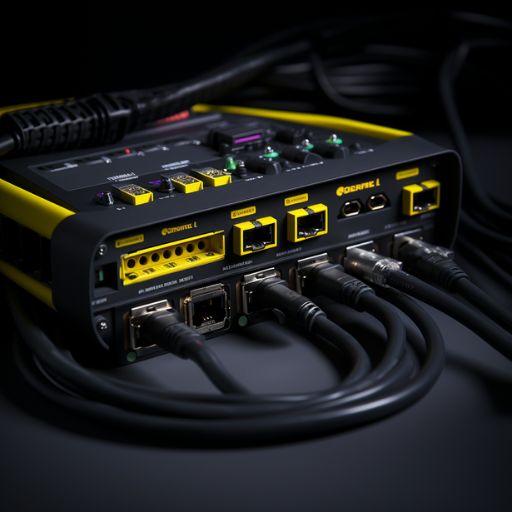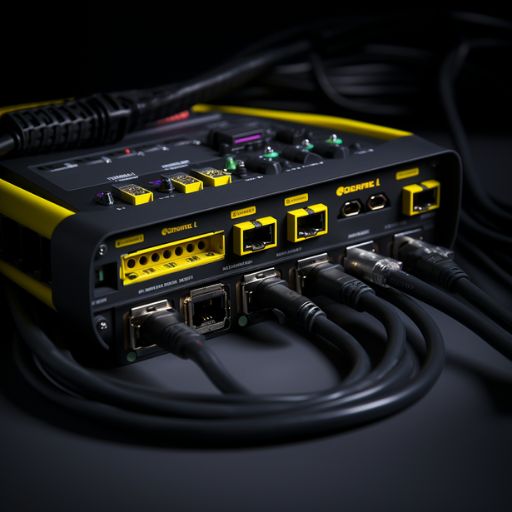Introduction
KVM switches, also known as Keyboard, Video, and Mouse switches, are essential devices that allow users to control multiple computers from a single keyboard, monitor, and mouse. These switches are crucial in various settings, such as data centers, offices, and even home setups, where there is a need to manage multiple computers simultaneously. They not only save space but also improve efficiency by eliminating the need for multiple peripherals.
This article will delve into the evolution of KVM switches, exploring how they have transformed over the years to meet the changing needs of users. We will also look at the future trends of these devices, focusing on how they are likely to adapt to the ever-evolving technological landscape. For a more in-depth understanding, we will also explore some of the top KVM switches available in the market today.
History of KVM Switches
The history of KVM switches is a testament to the evolution of technology and the constant need for more efficient ways to manage multiple computers. KVM, which stands for Keyboard, Video, and Mouse, is a hardware device that allows users to control multiple computers from one set of keyboard, video monitor, and mouse. Over the years, KVM switches have undergone significant changes in design and functionality, adapting to the changing needs of users and advancements in technology.
The first generation of KVM switches emerged in the late 1980s and early 1990s. These were simple mechanical switches that allowed users to control two or more computers from a single keyboard, monitor, and mouse. However, these early models were limited in their functionality and often required manual switching and reconfiguration of cables.
As technology advanced, so did the design and functionality of KVM switches. The second generation of KVM switches, which emerged in the late 1990s, introduced electronic switching and integrated functionality for audio and USB devices. These switches also started to support higher video resolutions, making them more suitable for graphic-intensive applications.
The third and current generation of KVM switches have taken the technology to a whole new level. These switches now support digital signals, allowing for the transmission of high-definition video and audio. They also feature advanced functionality such as remote access, multi-monitor support, and the ability to control a large number of computers.
Below is a comparison of different generations of KVM switches:
| Generation | Key Advancements |
|---|---|
| First Generation (1980s-1990s) | Simple mechanical switches, control of multiple computers from a single set of peripherals |
| Second Generation (Late 1990s) | Electronic switching, integrated audio and USB functionality, support for higher video resolutions |
| Third Generation (2000s-Present) | Support for digital signals, high-definition video and audio, remote access, multi-monitor support, control of a large number of computers |
Today, KVM switches are an essential tool in many IT environments, providing efficient and flexible solutions for managing multiple computers. As technology continues to evolve, we can expect to see even more advancements in the design and functionality of KVM switches.
For more information on KVM switches, check out these articles on Understanding the Functionality and Benefits of KVM Switches and Exploring the Advanced Features and Uses of KVM Switches.
Current State of KVM Switches
The current state of KVM switches is marked by a variety of models offering advanced features and functionalities. These devices have become increasingly popular due to their ability to allow users to control multiple computers from a single keyboard, video monitor, and mouse. This section will discuss some of the most popular models and their features.
Popular KVM Switch Models
One of the most popular models is the USB 3.0 Switch Selector by Rytaki. This model allows 2 computers to share 4 USB devices, such as a printer, scanner, mouse, keyboard, and other USB devices. It features a button switch and LED indicator for easy system switching and a super speed data transferring rate up to 5Gb/s. It also offers great compatibility with Windows 10/8/8.1/7/Vista/XP and Mac, Linux, and Chrome OS.
Another popular model is the Duttek 2-Port VGA Switch. This model displays the video output of 2 computers on a single monitor or projector and provides up to 250MHz bandwidth for video clarity. It supports VGA resolutions up to full HD 1920×1080 and WUXGA 1920×1440.
The AAO 2X1 KVM Switch HDMI 4K 2 Port USB KVM Switch Box is also a popular choice. It supports wireless input devices and offers two switch modes between two PCs. It also supports full HD 4K visual enjoyment, making image display more exquisite and realistic.
Advanced Features of KVM Switches
Modern KVM switches offer a range of advanced features. For instance, the IOGEAR 2-Port Dual View Dual Link DVI KVMP Switch supports dual monitor dual-link DVI, allowing users to share 2 DVI monitors with a single keyboard and mouse between 2 computers. It also supports up to Dual-Link Resolution 2560 x 1600 and 4K UHD 3840 x 2160 @30Hz resolution.
The KVM Switch HDMI 2 Port by Steetek supports 4K@60Hz resolution and is backward compatible with lower resolutions. It also comes with 2 USB 2.0 hubs, supporting USB 2.0/1.1 devices.
For more information on the functionality and benefits of KVM switches, you can visit this page. To explore the advanced features and uses of KVM switches, check out this article.

Future Trends in KVM Switches
As technology continues to evolve, so does the functionality and capabilities of KVM switches. These devices, which allow users to control multiple computers from a single keyboard, video monitor, and mouse, are expected to undergo significant advancements in the future. This evolution will be driven by various factors, including technological advancements, user needs, and market trends.
Technological Advancements
One of the main drivers of future trends in KVM switches is technological advancements. For instance, the development of USB 3.0 technology has led to the creation of KVM switches that support faster data transfer rates, such as the USB 3.0 Switch Selector by Rytaki. This device allows two computers to share four USB devices, offering a data transferring rate up to 5Gb/s, which is ten times faster than USB 2.0.
Another technological advancement is the support for 4K resolution. KVM switches like the Steetek KVM Switch HDMI 2 Port support up to 4K@60Hz resolution, providing users with a super high-definition visual feast.
User Needs
The evolution of KVM switches is also influenced by user needs. As users require more efficient and convenient ways to manage multiple computers, manufacturers are developing KVM switches with features like hotkey switching and LED indicators. For example, the AAO 2X1 KVM Switch HDMI 4K supports wireless input devices and offers two switch modes, allowing users to easily switch between two PCs.
Market Trends
Market trends also play a crucial role in shaping the future of KVM switches. With the increasing demand for remote work solutions, KVM switches like the IOGEAR 2-Port Dual View Dual Link DVI KVMP Switch are becoming more popular. This device allows users to share two DVI monitors with a single keyboard and mouse between two computers, making it an ideal solution for remote work setups.
In conclusion, the future of KVM switches looks promising, with numerous advancements on the horizon. As technology continues to evolve, users can expect to see KVM switches with more advanced features, improved performance, and greater convenience.
For more information on KVM switches, check out our articles on Understanding the Functionality and Benefits of KVM Switches and Exploring the Advanced Features and Uses of KVM Switches.
Productpickr.com
For those in search of the perfect KVM switch, Productpickr.com is an invaluable resource. This website offers a comprehensive comparison of various KVM switches, making it easier for users to find the one that best suits their needs. With detailed product information and user reviews, Productpickr.com simplifies the process of finding and comparing KVM switches.
Related Posts
Here are some related posts that you might find interesting:
- Understanding the Functionality and Benefits of KVM Switches
- Exploring the Advanced Features and Uses of KVM Switches
Also, check out these related products:
- USB 3.0 Switch Selector,4 Ports USB 3.0 KVM Switch hub Sharing Switcher Box for Mouse, Keyboard, Printer, Scanner with One Switch Button and 2 Pcs USB A to A Cable
- Duttek 2-Port VGA Switch 2 in 1 Out for PC or Monitor Sharing or Switching
- AAO 2X1 KVM Switch HDMI 4K 2 Port USB KVM Switch Box Supports Auto-scan, Hot-Key Switch for Netware, Dos, Linux, Unix and Windows 4K@30Hz with 2 Pcs 5ft USB Cables and HDMI Cables Gray
Conclusion
In conclusion, KVM switches have evolved significantly over the years, becoming an essential tool for many users. They offer a convenient solution for managing multiple computers from a single set of peripherals, such as a keyboard, mouse, and monitor. The past, present, and future of KVM switches are marked by continuous innovation and improvement, making them increasingly efficient and user-friendly.
From the basic 2 Ports VGA Switch Selector Box to the advanced IOGEAR 2-Port Dual View Dual Link DVI KVMP Switch, the range of KVM switches available today caters to a variety of user needs and preferences. The KVM Switches category on ProductPickr features a diverse selection of these devices, each with its unique features and specifications.
Understanding the past, present, and future of KVM switches is crucial for users and potential buyers. It helps them make informed decisions and choose the right product that meets their specific requirements. Whether you need a KVM switch for personal use at home or for professional use in an office or data center, understanding the functionality, benefits, and advanced features of these devices can guide you in the right direction.
For more in-depth information and reviews on KVM switches, you can visit the articles “Understanding the Functionality and Benefits of KVM Switches” and “Exploring the Advanced Features and Uses of KVM Switches“.
In the future, we can expect to see even more advanced and versatile KVM switches, offering greater convenience and efficiency for users. Stay updated with the latest trends and developments in the world of KVM switches to make the most of these innovative devices.












